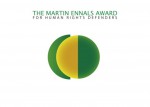This award is selected by the International Human Rights Community (See Jury Below) and given to Human Rights Defenders who have shown deep commitment and face great personal risk. The aim of the award is to provide protection through international recognition.

1.Mona Seif, Egypt: Core founder of the ”No To Military Trials for Civilians”, a grassroots initiative which is trying to stop military trials for civilians. Since February 25, 2011, Mona has brought together activists, lawyers, victims’ families, local stakeholders and started a nationwide movement against military trials. As part of the recent crackdown on the Freedom of Speech in Egypt she has been charged along with other Human Rights activists. She noted that “International solidarity, and I mean people’s support not governments, empowers us to continue our battle and stop military trials for civilians”.
2. Joint Mobile Group: After the murder of several human rights activists working in Chechnya, Igor Kalyapin started the Joint Mobile Group. To reduce the risk they send investigators on short missions to Chechnya to document Human Rights abuses. This information is then used to publicise these abuses to seek legal redress. Igor Kalyapin speaking of the effect of international publicity said “… when the international community is watching us it is more difficult for the authorities to take steps against us…”http://player.vimeo.com/video/64618318
Joint Mobile Group – Martin Ennals Award Nominee 2013 from Martin Ennals Award on Vimeo.
3. Mario Joseph, referred to as Haiti’s most important Human Rights lawyer, he has worked on some of the most important cases in Haiti, including the current case against the former dictator Jean-Claude “Baby Doc” Duvalier. His family received asylum in the United States in 2004, while he chose to return to Haiti. He has faced threats and harassment for much of his 20 years as a lawyer although it has intensified in recent months. “this recognition from the Ennals Award shines a vital spotlight on my work, and on the work of everyone who is fighting for human rights in Haiti. That spotlight will make our work safer and more effective.”
The Award will be presented on Oct. 8th at a ceremony hosted by the City of Geneva.
The main award of the human rights movement. The Martin Ennals Award for Human Rights Defenders (MEA) is a unique collaboration among ten of the world’s leading human rights organizations to give protection to human rights defenders worldwide.
Biographical information – Joint Mobile Group
The Joint Mobile Group seeks accountability for human rights abuses in Chechnya, notably enforced disappearances, torture in custody, and extra-judicial executions. Following the murders in 2009 of Natalia Estemirova, Zarema Saydulayeva, and Alik Dzhabrailov who were investigating human rights abuses in Chechnya, it became even more dangerous to work there. The existing organizations were forced to stop their work. In response, Igor Kalyapin, who heads the Committee Against Torture (CAT), structured a new approach.
The Joint Mobile Group (JMG) coordinated by CAT works with human rights lawyers who volunteer to investigate abuses in Chechnya itself. They go for short periods and then leave again. This has allowed them to investigate abduction, torture, disappearances and murder. They support the victims and their families by being available 24 hours per day, in case of reprisals. In this way, JMG has become one of the main sources of information on human rights abuses in the Chechen Republic, and uses this information to put pressure on the authorities.
Despite the almost complete impunity for human rights violations committed by the authorities, there have been isolated successes. For example, Islam Umarpashaev was abducted from his home in Dec 2009 and held incommunicado for several months, and tortured. Due to the relentless efforts of the JMG and its leader Igor Kalyapin, there has been unprecedented progress into this case. JMG helped Umarpashev’s relatives file an application with the European Court of Human Rights in January 2010, and Umarpashev was freed in April 2010. In January 2011, after an intense public campaign, the official investigation into the case was transferred to the federal level, although there has been little progress to date.
JMG has been instrumental in revealing the systematic violation of human rights in Chechnya as well as the lack of political will to address this issue. Their approach is to use the Russian legal system as well as any international mechanisms that the Russian state is part of. Despite the danger of their work they have managed to force the authorities to open cases where state authorities have been accused of severe human rights violations.
JMG members are routinely harassed, detained, and interrogated. In June 2012, Chechnya’s leader, Ramzan Kadyrov, personally threatened three JMG lawyers at a televised meeting sending a clear warning to victims to avoid the organization. A month later, federal investigators interrogated Igor Kalyapin as part of a criminal inquiry into alleged disclosure of secret information regarding the case of Islam Umarpashaev. This is the authorities’ third attempt in two years to open criminal proceedings against Kalyapin. Despite this harassment, JMG lawyers continue their work, knowing that if they stop, victims and their families would have no one else to turn to for assistance in seeking justice for horrendous crimes inflicted upon them.
While Igor Kalyapin pioneered the JMG concept, it is the work of dedicated anonymous people at the Joint Mobile Group who risk their lives by visiting Chechnya and providing credible professional reports on human rights abuses that help hold the authorities accountable.